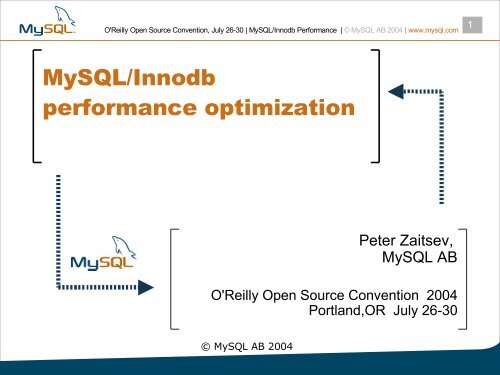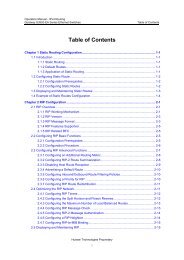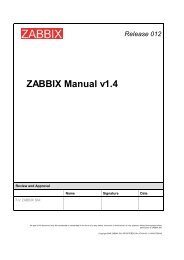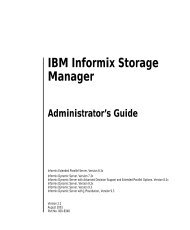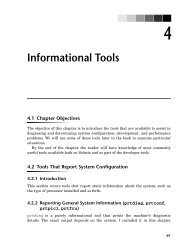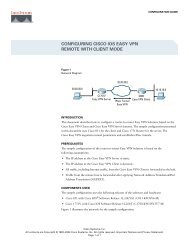MySQL/Innodb Performance Optimization
MySQL/Innodb Performance Optimization
MySQL/Innodb Performance Optimization
Create successful ePaper yourself
Turn your PDF publications into a flip-book with our unique Google optimized e-Paper software.
O'Reilly Open Source Convention, July 26-30 | <strong>MySQL</strong>/<strong>Innodb</strong> <strong>Performance</strong> | © <strong>MySQL</strong> AB 2004 | www.mysql.com 1<br />
<strong>MySQL</strong>/<strong>Innodb</strong><br />
performance optimization<br />
Peter Zaitsev,<br />
<strong>MySQL</strong> AB<br />
O'Reilly Open Source Convention 2004<br />
Portland,OR July 26-30<br />
© <strong>MySQL</strong> AB 2004
O'Reilly Open Source Convention, July 26-30 | <strong>MySQL</strong>/<strong>Innodb</strong> <strong>Performance</strong> | © <strong>MySQL</strong> AB 2004 | www.mysql.com 2<br />
About Presentation<br />
• Optimizing <strong>MySQL</strong>/<strong>Innodb</strong> <strong>Performance</strong><br />
• Quick walk through – parameters/schema/OS<br />
• Using DBT2 by OSDL, TPC-C like benchmark<br />
• Practical approach – finding and eliminating next<br />
bottleneck<br />
• Real performance figures<br />
– Numerical value of each performance improvement<br />
• Why <strong>Innodb</strong> ?<br />
– MyISAM can't run transactional benchmark<br />
– There seems to be lack of <strong>Innodb</strong> optimization info
O'Reilly Open Source Convention, July 26-30 | <strong>MySQL</strong>/<strong>Innodb</strong> <strong>Performance</strong> | © <strong>MySQL</strong> AB 2004 | www.mysql.com 3<br />
DBT2 Benchmark Info<br />
• Developed by OSDL (Mark Wong and Co)<br />
– <strong>MySQL</strong> port done by Alexey Stroganov<br />
– Finally available in DBT2 mainline<br />
• More information: http://sourceforge.net/projects/osdldbt<br />
• Quite close TPC-C implementation, but allows wider<br />
parameter range<br />
• Results are incompatible with TPC-C and can't be<br />
compared to them<br />
• TPC-C Benchmark Description<br />
http://www.tpc.org/tpcc/detail.asp
O'Reilly Open Source Convention, July 26-30 | <strong>MySQL</strong>/<strong>Innodb</strong> <strong>Performance</strong> | © <strong>MySQL</strong> AB 2004 | www.mysql.com 4<br />
Benchmark Configuration<br />
• Two workloads “large” and “small”<br />
• 200 Warehouse database – about 30Gb real size on the<br />
disk<br />
• “small” workload touchs 10 of them, being CPU bound<br />
• Using 200 “terminals” and 20 connections in all cases<br />
• Zero “think time” to fully load database<br />
• Hardware<br />
– 4*Xeon 2.0 Ghz MP (with HT), 512K cache, 4G of memory<br />
– 8SATA 7200 drives in RAID10, 1024K chunk on<br />
3WARE8500-8<br />
– System on Separate set SCSI drives<br />
• Software: RH AS 3.0, <strong>MySQL</strong> 4.1.3-beta
O'Reilly Open Source Convention, July 26-30 | <strong>MySQL</strong>/<strong>Innodb</strong> <strong>Performance</strong> | © <strong>MySQL</strong> AB 2004 | www.mysql.com 5<br />
Running Benchmark<br />
• Default Kernel: 2.4.21-9.ELhugemem<br />
• Default Filesystem: EXT3<br />
• Swap partition disabled<br />
• Run series<br />
– 4 runs, 2 “large” load , followed by 2 “small” load<br />
– Sleeps between loads to allow database to settle down<br />
– 15min + 5 min warmup for each of loads<br />
• Best out of 2 results is taken in most cases<br />
• Additional experiments performed to measure acuracy of<br />
approach<br />
• Results in TPM (transactions per minute), More is better
O'Reilly Open Source Convention, July 26-30 | <strong>MySQL</strong>/<strong>Innodb</strong> <strong>Performance</strong> | © <strong>MySQL</strong> AB 2004 | www.mysql.com 6<br />
Default Schema and <strong>MySQL</strong><br />
options<br />
• Very poor results<br />
– Lets try to take a look what we can do with schema<br />
LARGE SMALL<br />
Default Options 55 69
O'Reilly Open Source Convention, July 26-30 | <strong>MySQL</strong>/<strong>Innodb</strong> <strong>Performance</strong> | © <strong>MySQL</strong> AB 2004 | www.mysql.com 7<br />
Analysing Results<br />
• Running “mysqladmin -i10 -r extended”<br />
• Massive amount of range or index scans<br />
| Handler_commit | 41 |<br />
| Handler_delete | 0 |<br />
| Handler_read_first | 4 |<br />
| Handler_read_key | 4599 |<br />
| Handler_read_next | 7063454 |<br />
| Handler_read_prev | 0 |<br />
| Handler_read_rnd | 329 |
O'Reilly Open Source Convention, July 26-30 | <strong>MySQL</strong>/<strong>Innodb</strong> <strong>Performance</strong> | © <strong>MySQL</strong> AB 2004 | www.mysql.com 8<br />
Enabling logging to catch the<br />
query<br />
• Enable slow query log, adding options to my.cnf<br />
– Log-slow-queries<br />
– Log-long-format<br />
– Long-query-time=2<br />
• Rerunning benchmark to get slow queries logged
O'Reilly Open Source Convention, July 26-30 | <strong>MySQL</strong>/<strong>Innodb</strong> <strong>Performance</strong> | © <strong>MySQL</strong> AB 2004 | www.mysql.com 9<br />
Analyzing slow query log<br />
• # Query_time: 21 Lock_time: 0 Rows_sent: 0<br />
Rows_examined: 0 UPDATE warehouse SET w_ytd =<br />
w_ytd + 2628.000000 WHERE w_id = 25;<br />
• Can't run EXPLAIN with UPDATE, changing to SELECT<br />
mysql> explain select * from warehouse where w_id=25;<br />
| id | select_type | table | type | possible_keys | key |key_len | ref | rows | Extra |<br />
| 1 | SIMPLE | warehouse | const | PRIMARY | PRIMARY | 4 | const | 1 |<br />
This is "false" slow query. It is very simple query by nature but system was likely to overloaded or<br />
there was Row level lock wait which delayed it. We can't know without response time profiling.
O'Reilly Open Source Convention, July 26-30 | <strong>MySQL</strong>/<strong>Innodb</strong> <strong>Performance</strong> | © <strong>MySQL</strong> AB 2004 | www.mysql.com 10<br />
Analysing Slow Query Log<br />
• # Query_time: 10 Lock_time: 0 Rows_sent: 2<br />
Rows_examined: 3002 SELECT c_id FROM customer<br />
WHERE c_w_id = 25 AND c_d_id = 4 AND c_last =<br />
'ANTIEINGANTI' ORDER BY c_first ASC;<br />
• mysql> EXPLAIN SELECT c_id FROM customer WHERE<br />
c_w_id = 25 AND c_d_id = 4 AND c_last =<br />
'ANTIEINGANTI' ORDER BY c_first ASC;<br />
| id | select_type | table | type | possible_keys | key |key_len | ref | rows | Extra |<br />
| 1 | SIMPLE | customer | ref | PRIMARY | PRIMARY | 8| const,const |6028 |<br />
Using where; Using filesort |<br />
Good query from glance view, But we can do better extending key to<br />
(c_w_id,c_d_id,c_last,c_first) – this will avoid to avoid filesort as well
O'Reilly Open Source Convention, July 26-30 | <strong>MySQL</strong>/<strong>Innodb</strong> <strong>Performance</strong> | © <strong>MySQL</strong> AB 2004 | www.mysql.com 11<br />
Slow Log: Found real issue<br />
• # Query_time: 350 Lock_time: 0 Rows_sent: 977<br />
Rows_examined: 1818725 SELECT no_o_id FROM<br />
new_order WHERE no_w_id = 3 AND no_d_id = 1<br />
• mysql> EXPLAIN SELECT no_o_id FROM new_order<br />
WHERE no_w_id = 3 AND no_d_id = 1<br />
•| 1 | SIMPLE | new_order | index | NULL | PRIMARY | 12 | NULL | 1543785 | Using<br />
where; Using index<br />
• Query full index scan while it can be “ref” type<br />
• Will need to add key with (no_w_id,no_d_id) prefix
O'Reilly Open Source Convention, July 26-30 | <strong>MySQL</strong>/<strong>Innodb</strong> <strong>Performance</strong> | © <strong>MySQL</strong> AB 2004 | www.mysql.com 12<br />
Slow Query Hunting & optimizing<br />
tips<br />
• Hard to find all bad queries from first run<br />
– Flooded with most common slow queries<br />
– Optimize them and run once again<br />
• Use SHOW PROCESSLIST to catch most typical queries<br />
and check them.<br />
• Running ALTER TABLE for large INNODB table<br />
– Set innodb_buffer_pool to 80% of physical mamory<br />
– Increase innodb_log_file_size=512M<br />
– Allow ALTER TABLE to complete, rollback at startup is even<br />
longer<br />
• Benchmark with smaller database size to find optimal<br />
indexes<br />
• Use ALTER TABLE to add all indexes at once instead of<br />
CREATE INDEX
O'Reilly Open Source Convention, July 26-30 | <strong>MySQL</strong>/<strong>Innodb</strong> <strong>Performance</strong> | © <strong>MySQL</strong> AB 2004 | www.mysql.com 13<br />
Results for Indexed run<br />
• We get almost 8.5 times better performance by indexing<br />
• Strange enough SMALL load is slower than LARGE<br />
– Likely due to increased concurrency<br />
LARGE Ratio SMALL Ratio<br />
Default 55 69<br />
Indexed 463 8.42 409 5.93
O'Reilly Open Source Convention, July 26-30 | <strong>MySQL</strong>/<strong>Innodb</strong> <strong>Performance</strong> | © <strong>MySQL</strong> AB 2004 | www.mysql.com 14<br />
Review how status changed<br />
• Now “mysqladmin -i10 -r extended” looks much healthier<br />
• No excessive index scans<br />
Handler_read_first | 0<br />
Handler_read_key | 120614<br />
Handler_read_next | 573905<br />
Handler_read_prev | 0<br />
Handler_read_rnd | 7783<br />
Handler_read_rnd_next | 0<br />
Handler_rollback | 10<br />
Handler_update | 0<br />
Handler_write | 10003
O'Reilly Open Source Convention, July 26-30 | <strong>MySQL</strong>/<strong>Innodb</strong> <strong>Performance</strong> | © <strong>MySQL</strong> AB 2004 | www.mysql.com 15<br />
SHOW INNODB STATUS Review<br />
• SHOW INNODB STATUS – command to view Internal<br />
INNODB runtime stats<br />
• FILE IO<br />
– 520155 OS file reads, 146300 OS file writes, 7609 OS fsyncs<br />
1106.36 reads/s, 17133 avg bytes/read, 301.87 writes/s,<br />
15.05 fsyncs/s<br />
• Very high amount of reads !<br />
– More than hardware can physically do<br />
• Default innodb_buffer_pool is 8M<br />
– Increasing it to 1800M<br />
– Can't do more due to 32bit limits and GLIBC limits
O'Reilly Open Source Convention, July 26-30 | <strong>MySQL</strong>/<strong>Innodb</strong> <strong>Performance</strong> | © <strong>MySQL</strong> AB 2004 | www.mysql.com 16<br />
Results with larger Buffer Pool<br />
• Once again good performance improvement<br />
• SMALL workload is now faster as expected<br />
LARGE Ratio SMALL Ratio<br />
Default<br />
55 69<br />
Indexed 463 8.42 409 5.93<br />
IBP=1800M 931 16.93 2107 30.54
O'Reilly Open Source Convention, July 26-30 | <strong>MySQL</strong>/<strong>Innodb</strong> <strong>Performance</strong> | © <strong>MySQL</strong> AB 2004 | www.mysql.com 17<br />
Taking a closer look at SHOW<br />
INNODB STATUS<br />
• Running “SHOW INNODB STATUS” during the test<br />
• Looking at “BUFFER POOL AND MEMORY” section<br />
– Pages read 576279, created 13448, written 1082267 85.84<br />
reads/s, 4.03 creates/s, 542.08 writes/s Buffer pool hit rate<br />
999 / 1000<br />
• We have 6 times more writes than reads<br />
– We do not expect it for our benchmark<br />
– Reason: default innodb_log_file_size=5MB<br />
– Massive dirty page flushes, which can be postponed<br />
• Buffer pool hit rate almost perfect<br />
– confirming “hit ratios” are not always helpful
O'Reilly Open Source Convention, July 26-30 | <strong>MySQL</strong>/<strong>Innodb</strong> <strong>Performance</strong> | © <strong>MySQL</strong> AB 2004 | www.mysql.com 18<br />
Increasing log files sizes<br />
• We'll set innodb_log_file_size=512M<br />
• Tricky Operation !<br />
– Shut down <strong>MySQL</strong> Server clearly<br />
– Move your old <strong>Innodb</strong> logs to the safe place<br />
– Change innodb_log_file_size<br />
– Restart and wait for new logs to be created<br />
• Larger logs require longer recovery time<br />
– small logs do not guaranty short recovery time
O'Reilly Open Source Convention, July 26-30 | <strong>MySQL</strong>/<strong>Innodb</strong> <strong>Performance</strong> | © <strong>MySQL</strong> AB 2004 | www.mysql.com 19<br />
Results with<br />
innodb_log_file_size=512M<br />
• Good improvement for both “large” and “small” loads<br />
LARGE Ratio SMALL Ratio<br />
Default<br />
55 69<br />
Indexed 463 8.42 409 5.93<br />
IBP=1800M 931 16.93 2107 30.54<br />
ILFS=512M 1223 22.24 3099 44.91
O'Reilly Open Source Convention, July 26-30 | <strong>MySQL</strong>/<strong>Innodb</strong> <strong>Performance</strong> | © <strong>MySQL</strong> AB 2004 | www.mysql.com 20<br />
Detailed Analyses<br />
• Mysqladmin -i10 -r extended<br />
– Opened_tables 502<br />
• More than 50 table opens per second, need to increase<br />
table_cache<br />
• SHOW INNODB STATUS<br />
– 6 queries inside InnoDB, 4 queries in queue<br />
• Increase innodb_thread_concurrency=32<br />
(num_disks+num_cpus)*2<br />
– 89275 log i/o's done, 73.81 log i/o's/second<br />
• Rather high log IO<br />
– Set innodb_log_buffer_size=8M
O'Reilly Open Source Convention, July 26-30 | <strong>MySQL</strong>/<strong>Innodb</strong> <strong>Performance</strong> | © <strong>MySQL</strong> AB 2004 | www.mysql.com 21<br />
Results after these optimizations<br />
• Extra 10% for SMALL load<br />
– Typical for optimization<br />
• Few changes give major impact<br />
• Afterwards you only move by few percent<br />
LARGE Ratio SMALL Ratio<br />
Default<br />
55 69<br />
Indexed 463 8.42 409 5.93<br />
IBP=1800M 931 16.93 2107 30.54<br />
ILFS=512M 1223 22.24 3099 44.91<br />
Optimized 1259 22.89 3442 49.88
O'Reilly Open Source Convention, July 26-30 | <strong>MySQL</strong>/<strong>Innodb</strong> <strong>Performance</strong> | © <strong>MySQL</strong> AB 2004 | www.mysql.com 22<br />
Taking a closer look at Schema<br />
• We previously added key to this table to optimize query<br />
– It matches PRIMARY KEY but order of columns is<br />
different.<br />
– We can change primary key to it and have only one key<br />
• This assumes we do not have any queries using current<br />
PK prefix (these could break)<br />
• This table has many inserts, so saving keys is important<br />
CREATE TABLE `new_order` (<br />
`no_o_id` int(11) NOT NULL default '0',<br />
`no_d_id` int(11) NOT NULL default '0',<br />
`no_w_id` int(11) NOT NULL default '0',<br />
PRIMARY KEY(`no_o_id`,`no_d_id`,`no_w_i`),<br />
KEY `no_d_id` (`no_d_id`,`no_w_id`,`no_o_id`)<br />
)
O'Reilly Open Source Convention, July 26-30 | <strong>MySQL</strong>/<strong>Innodb</strong> <strong>Performance</strong> | © <strong>MySQL</strong> AB 2004 | www.mysql.com 23<br />
Shorterning primary key<br />
• (s_w_id,s_i_id) is already unique, so s_quantity is not<br />
needed in PK<br />
• This field is frequently updated<br />
– Updates of Primary key columns are very expensive<br />
CREATE TABLE `stock` (<br />
`s_i_id` int(11) NOT NULL default '0',<br />
`s_w_id` int(11) NOT NULL default '0',<br />
`s_quantity` double NOT NULL default '0',<br />
`s_dist_01` varchar(24) default NULL,<br />
...<br />
`s_ytd` decimal(16,8) default NULL,<br />
`s_order_cnt` double default NULL,<br />
`s_remote_cnt` double default NULL,<br />
`s_data` varchar(50) default NULL,<br />
PRIMARY KEY (`s_w_id`,`s_i_id`,`s_quantity`)<br />
)
O'Reilly Open Source Convention, July 26-30 | <strong>MySQL</strong>/<strong>Innodb</strong> <strong>Performance</strong> | © <strong>MySQL</strong> AB 2004 | www.mysql.com 24<br />
Changing physical row layout<br />
• Rebuilding table can help performance<br />
– Reducing table fragmentation<br />
• Faster table scan<br />
– Making data better clustered by Primary Key<br />
– Reducing data size<br />
• More tight page packing<br />
• Done by “ALTER TABLE tbl TYPE=INNODB”<br />
– Or just “OPTIMIZE TABLE” in newer <strong>MySQL</strong> versions.
O'Reilly Open Source Convention, July 26-30 | <strong>MySQL</strong>/<strong>Innodb</strong> <strong>Performance</strong> | © <strong>MySQL</strong> AB 2004 | www.mysql.com 25<br />
Updated Results<br />
• Good improvement for “small” load<br />
• About the same performance for “large” load<br />
– “large” load may suffer from more page splits<br />
LARGE Ratio SMALL Ratio<br />
Default<br />
55 69<br />
Indexed 463 8.42 409 5.93<br />
IBP=1800M 931 16.93 2107 30.54<br />
ILFS=512M 1223 22.24 3099 44.91<br />
Optimized 1259 22.89 3442 49.88<br />
Layout 1250 22.73 4650 67.39
O'Reilly Open Source Convention, July 26-30 | <strong>MySQL</strong>/<strong>Innodb</strong> <strong>Performance</strong> | © <strong>MySQL</strong> AB 2004 | www.mysql.com 26<br />
Other usable hints<br />
• Use short integer primary keys<br />
– All secondary keys reference rows by primary keys<br />
• Avoid random primary keys (ie GUID)<br />
– Inserts in random places in BTREE fragment table badly<br />
• Use prefix keys where possible<br />
– <strong>Innodb</strong> does not have key compression as MyISAM<br />
– ALTER TABLE TBL ADD KEY (COL(16))
O'Reilly Open Source Convention, July 26-30 | <strong>MySQL</strong>/<strong>Innodb</strong> <strong>Performance</strong> | © <strong>MySQL</strong> AB 2004 | www.mysql.com 27<br />
<strong>Innodb</strong> IO Modes<br />
• Set by innodb_flush_method option<br />
• O_DIRECT gives great result by avoiding double buffering<br />
and other overheads<br />
– Still rather new kernel feature, not all file systems support it<br />
• O_DSYNC increases DoubleWrite overhead a lot. Avoid it<br />
IO Mode LARGE Ratio SMALL Ratio<br />
Default 1250 4640<br />
O_DIRECT 1931 1.54 5542 1.19<br />
O_DSYNC 995 0.8 4498 0.97
O'Reilly Open Source Convention, July 26-30 | <strong>MySQL</strong>/<strong>Innodb</strong> <strong>Performance</strong> | © <strong>MySQL</strong> AB 2004 | www.mysql.com 28<br />
What if you do not need full<br />
Durability<br />
• In many cases (including ours) fsync() is fake, not flushing<br />
drive cache<br />
– We still do not get 100% durability<br />
• <strong>Innodb</strong> allows to avoid log flushing at commit<br />
– innodb_flush_log_at_trx_commit=0 – do not flush log<br />
– innodb_flush_log_at_trx_commit=2 – flush to OS cache<br />
only<br />
• <strong>Innodb</strong> still does full log flush to disk about once per<br />
second.<br />
Log flush LARGE Ratio SMALL Ratio<br />
Default (1) 1250 4640<br />
Disabled(0) 1265 1.01 6071 1.31
O'Reilly Open Source Convention, July 26-30 | <strong>MySQL</strong>/<strong>Innodb</strong> <strong>Performance</strong> | © <strong>MySQL</strong> AB 2004 | www.mysql.com 29<br />
RH AS Kernel Variants<br />
• “Hugemem” has 4G:4G memory split but at cost<br />
– Allowing you to allocate almost 4G of memory<br />
• New RedHat kernel improved, but still can be worse than<br />
“smp”<br />
LARGE Ratio SMALL Ratio<br />
2.4.219.ELhugemem 1250 4640<br />
2.4.219.ELsmp 1485 1.19 8132 1.75<br />
2.4.2115.ELhugemem 1664 1.33 4999 1.08
O'Reilly Open Source Convention, July 26-30 | <strong>MySQL</strong>/<strong>Innodb</strong> <strong>Performance</strong> | © <strong>MySQL</strong> AB 2004 | www.mysql.com 30<br />
What is about 2.6 ?<br />
• <strong>Performance</strong> in 2.6 is getting better<br />
– CPU bound load still not up to speed<br />
• Deadline scheduler is best one.<br />
– “elevator=deadline” kernel boot option<br />
2.4.219.ELsmp 1485 8132<br />
2.6.3 (as) 551 0.37 7587 0.93<br />
2.6.3 (deadline) 1872 1.26 7630 0.94<br />
2.6.7 (as) 1778 1.2 7657 0.94<br />
2.6.7 (deadline) 2238 1.51 7715 0.95<br />
2.6.7 (noop) 2219 1.49 7701 0.95
O'Reilly Open Source Convention, July 26-30 | <strong>MySQL</strong>/<strong>Innodb</strong> <strong>Performance</strong> | © <strong>MySQL</strong> AB 2004 | www.mysql.com 31<br />
Should I keep my swap enabled ?<br />
• 2.6.7 Does not suffer from enabled swap anymore<br />
– There was no swapping at all during test<br />
• 2.4 suffers from enabled swap really badly<br />
• 2.6.7 without swap is unsafe (OOM can trigger)<br />
LARGE Ratio SMALL Ratio<br />
2.4.219.ELsmp noswap 1485 8132<br />
2.4.219.ELsmp swap 384 0.26 3386 0.42<br />
2.6.7 noswap 2238 7715<br />
2.6.7 swap 2252 1.01 7755 1.01
O'Reilly Open Source Convention, July 26-30 | <strong>MySQL</strong>/<strong>Innodb</strong> <strong>Performance</strong> | © <strong>MySQL</strong> AB 2004 | www.mysql.com 32<br />
<strong>Performance</strong> of Direct IO<br />
• Direct IO is enabled by<br />
innodb_flush_method=O_DIRECT<br />
– Not all filesystems and kernels support it yet<br />
• Direct IO seems to reduce 4:4 memory split penalty<br />
Kernel 2.4.219.ELhugemem LARGE Ratio SMALL Ratio<br />
Buffered IO 1250 4640<br />
Direct IO 1931 1.54 5543 1.19<br />
Kernel 2.6.7 (deadline) LARGE Ratio SMALL Ratio<br />
Buffered IO 2238 7715<br />
Direct IO 2342 1.05 8737 1.13
O'Reilly Open Source Convention, July 26-30 | <strong>MySQL</strong>/<strong>Innodb</strong> <strong>Performance</strong> | © <strong>MySQL</strong> AB 2004 | www.mysql.com 33<br />
RAID10 Block Sizes<br />
• RAID10 3WARE8500-8, 8SATA 7200RPM Drives,<br />
• Kernel 2.4.21-9.ELhugemem, EXT3<br />
• No clear winner<br />
• Large chunk is best for “large” workload<br />
• 256K seems to be optimal for set of the two<br />
• Chunk size has huge impact on performance<br />
LARGE Ratio SMALL Ratio<br />
16K 761 0.61 4719 1.02<br />
64K 1059 0.85 4869 1.05<br />
256K 1237 0.99 4924 1.06<br />
1024K 1250 4640
O'Reilly Open Source Convention, July 26-30 | <strong>MySQL</strong>/<strong>Innodb</strong> <strong>Performance</strong> | © <strong>MySQL</strong> AB 2004 | www.mysql.com 34<br />
RAID Levels<br />
• Using 64K chunk<br />
– It is only supported by this hardware for RAID5<br />
• RAID0 best results but, not secure<br />
– Good candidate if you have many slave servers<br />
• RAID5 is very slow, especially for “LARGE” workload<br />
• RAID10 is normally the best choice<br />
LARGE Ratio SMALL Ratio<br />
RAID10 1059 4869<br />
RAID0 (insecure) 1206 1.14 4925 1.01<br />
RAID5 264 0.25 3422 0.7
O'Reilly Open Source Convention, July 26-30 | <strong>MySQL</strong>/<strong>Innodb</strong> <strong>Performance</strong> | © <strong>MySQL</strong> AB 2004 | www.mysql.com 35<br />
Conclusion<br />
• Over 100 times performance improved by tuning<br />
– 69 -> 8737 for small workload<br />
– One can do even better spending more time<br />
• Server tuning, schema, OS and hardware all important<br />
– schema is best place to start<br />
• <strong>MySQL</strong> provides powerful and easy to use tools for<br />
performance tuning, more on the way.<br />
• <strong>Optimization</strong> is never ending job<br />
– After few easy items you have mostly minor or expensive<br />
optimizations<br />
– Identify which performance do you need.
O'Reilly Open Source Convention, July 26-30 | <strong>MySQL</strong>/<strong>Innodb</strong> <strong>Performance</strong> | © <strong>MySQL</strong> AB 2004 | www.mysql.com 36<br />
Resources<br />
• http://www.mysql.com/doc - <strong>MySQL</strong> online Manual<br />
• http://lists.mysql.com - <strong>MySQL</strong> mailing list<br />
– Especially Main mailing lists, Benchmarks list<br />
• Get help and advice from <strong>MySQL</strong> employees<br />
– http://www.mysql.com/support - Support<br />
– http://www.mysql.com/consulting - Consulting<br />
• http://dev.mysql.com/tech-resources/articles/ - Tech Zone<br />
• http://www.livejournal.com/users/peter_zaitsev/ - My BLOG<br />
• Write me to peter@mysql.com if you have questions<br />
• Ask me during the the conference


